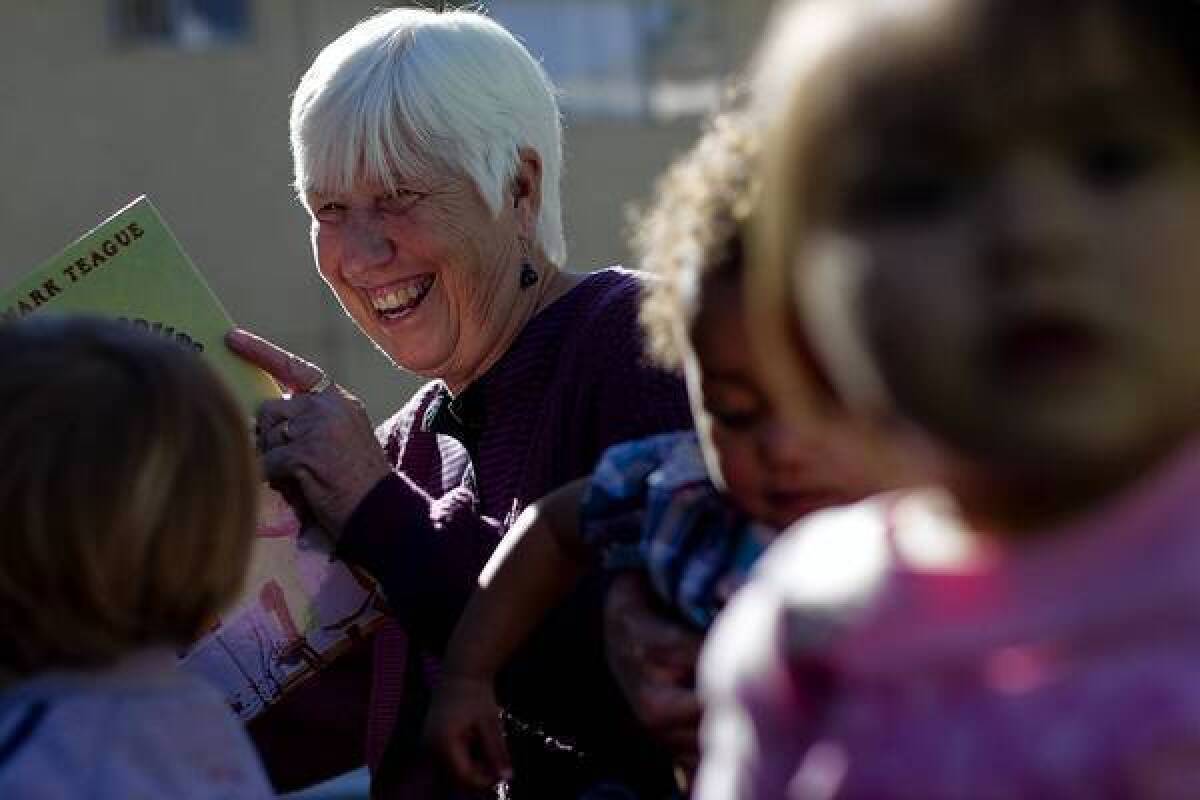The benefits of gratitude

- Share via
Before we eat Thanksgiving dinner at my house, along with saying grace, each of the 20 or so people at the table takes a turn lighting a candle and expressing gratitude. The appreciation can be lighthearted — for mashed potatoes or a day off from school. Or the thankfulness may be accompanied by a heavy heart — for the memories of a loved one recently passed.
As it happens, this expression is not an empty exercise. And if we developed the discipline to be consciously grateful on a regular basis, year-round, research shows we’d be happier and suffer less depression and stress. We’d sleep better and be better able to face our problems.
There’s evidence that gratitude is uniquely important to well-being. Long embraced by religion as a “manifestation of virtue,” it’s one of the few things that “can measurably change people’s lives,” says Robert Emmons, a UC Davis professor who has been studying gratitude since 1998 and is the author of the book “Thanks! How the New Science of Gratitude Can Make You Happier.”
“Gratitude implies humility — a recognition that we could not be who we are or where we are in life without the contributions of others,” Emmons writes.
At a time when Thanksgiving is the starting gun for a race to the mall, Jeffrey Froh has some insight as well.
“We know there’s a negative relationship between materialism and gratitude. That’s pretty powerful right there,” says Froh, a professor at Hofstra University on New York’s Long Island. His research with more than 1,000 high school students showed that grateful teenagers were also less likely to be depressed, more likely to want to give back to their communities and more likely to have higher grade-point averages, among other traits.
But despite the benefits, Emmons says, gratitude is in trouble.
“Outside of happiness, gratitude’s benefits are rarely discussed these days. Indeed, in contemporary American society, we’ve come to overlook, dismiss or even disparage the significance of gratitude as a virtue,” he says.
“We have become entitled, resentful, ungrateful and forgetful.”
Not all of us.
::
Judy Vaughan
“I learned from my mom the importance of saying thanks,” Vaughan says. “She was born in 1916 and came from the school that said when you got gifts, you wrote notes.”
Vaughan is a St. Joseph of Carondelet nun who “has real trouble with the institutional church” but a rock-solid belief in a God who is “a loving spirit who has my back,” and a doctorate in social ethics from the University of Chicago. She founded and has lived since 1996 at Alexandria House, which actually is two lovely Mid-Wilshire homes offering transitional housing and support to homeless women and their children.
“Gratitude gives an opening to the universe to give more good things. Gratitude is opening to receive more good things from the universe,” says Vaughan.
She tries to be grateful every day, even now, when Alexandria House faces falling state and private funding.
On this particular morning, a new resident complains that someone had eaten food she’d put in the kitchen. House rules are that anyone can eat food in the kitchen, and Vaughan asked the woman to sort it out with the other resident. They did, without a fight, and the new resident later told Vaughan she had a newfound appreciation for being pushed to work things out.
“Gratitude really is a perspective. It is one that needs to be cultivated,” Vaughan says. “It is a gift from God in my life that I like almost everyone I meet. I’m not naïve, but I really work at seeing the positive in people.”
Alexandria House can hold 28 people; the average length of stay is 10 months. Services include daycare, after-school and teen programs. More than 150 families have come through; most of them keep in touch.
Vaughan has a gentle demeanor and a white-haired Dorothy Hamill hairdo. At 53, she became a mother when a colleague came across a newborn who needed a home and asked Vaughan to consider it. Vaughan felt old, unprepared and, of course, she’s a nun. But “I held her up. That bonding thing is real.” Now her daughter is a high school freshman with a cool purple bedroom at Alexandria House.
The future is filled with uncertainty. “Right now we have no money. We have a stack of bills. Who do I call? Who can wait to be paid? But our doors are open today. I’m grateful for that.”
::
Louie Schwartzberg
Gratitude could save the planet, says filmmaker Louie Schwartzberg.
“If you can really absorb the beauty of a flower or a landscape, can you really bear to see it destroyed?” he asks. “Gratitude touches your heart. And we need the heart to create a shift in consciousness.”
Schwartzberg, who has been shooting time-lapse photography of flowers for more than three decades, showed his “Gratitude” film at a TEDx Talk; it’s among the most-watched presentations.
In it, author, lecturer and Benedictine brother David Steindl-Rast speaks: “You think this is just another day in your life. It’s not just another day. It’s the one day that is given to you, today. … It’s the only gift that you have right now, and the only appropriate response is gratefulness. … If you learn to respond as if it were the first day in your life and the very last day, then you will have spent this day very well.”
“People tell me they use [the film] it as a video alarm clock,” Schwartzberg says, meaning it calibrates their day.
Schwartzberg, who works in Studio City, is making a longer version of that film and another on bats, butterflies, bees and hummingbirds — the pollinators — that help produce one-third of our food. Nature, he says, teaches mindfulness, and the lessons learned lead to gratitude.
Look, really look, at a cloud, a stream, a strawberry, he urges. “Instead of gobbling it while you’re reading the paper, say, ‘Oh, my God,’ ” and take the time to be in awe of it.
::
Susan Swan
Gratitude, says Susan Swan, is an important component of yoga — something she’s taught since 1991.
Almost three years ago she had a stroke during a class. But when she tells the story, she focuses on her good fortune. Her students called 911, help came quickly and she was given an experimental drug that worked wonders. She has children, grandchildren and friends.
Swan goes to a support group of people who have had strokes. The members sometimes play a little game open only to people who have lost an ability: “Oh, you can talk. Can I trade my sense of walking? Should I keep my aphasia? It’s a weird way of counting your blessings. Some people are in a chair. Some people can do math.”
Right after the stroke, Swan couldn’t talk. Or count. One night in the hospital, she couldn’t sleep and decided to meditate. “OK, I’m going to count my breaths. One. … OK, I’ll do it again. One. … OK, I can only count one breath. And then one more.”
Swan doesn’t look like she’s had a stroke. At 68, she’s tall and wrinkle free, with straight, shiny blond hair. Her speech is good, her aphasia not overwhelming. She’s gone back to teaching yoga, which she credits for her ability to feel gratitude rather than anger.
It’s important, she says early one evening over tea in her tiny Larchmont kitchen, to “come into the now. Lose your mind and find your senses. Right now, I am fine.”
Swan, who also has survived breast and colon cancer, gives meaning to Emmons’ statement that gratitude “is morally and intellectually demanding.” He doesn’t suggest forgetting the negative.
When she was called for jury duty, Swan got confused about where to go, finding herself traipsing from one room to another before she finally figured it out. “When I get excited or stressed, it’s a nightmare. Each thing compounds your frustration, your sense of failure. She gives in to anger and frustration — but only briefly.
“It was a day. A day of my life. I’m fine. I was fine the whole time,” she says. “If you have something that life serves up, you have a choice to say, hey, there is a blessing in here. How is it going to serve me and not impede me?”







